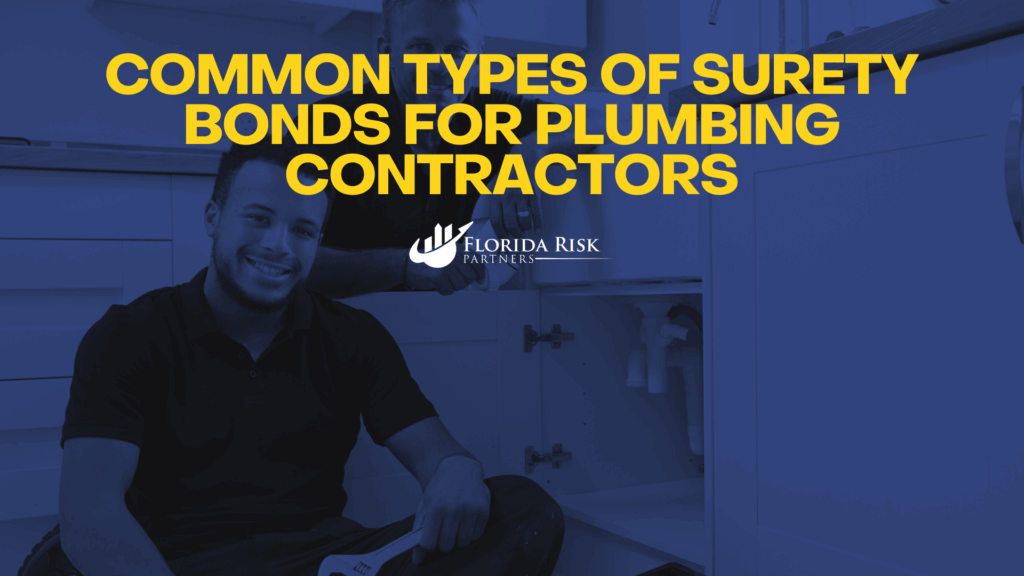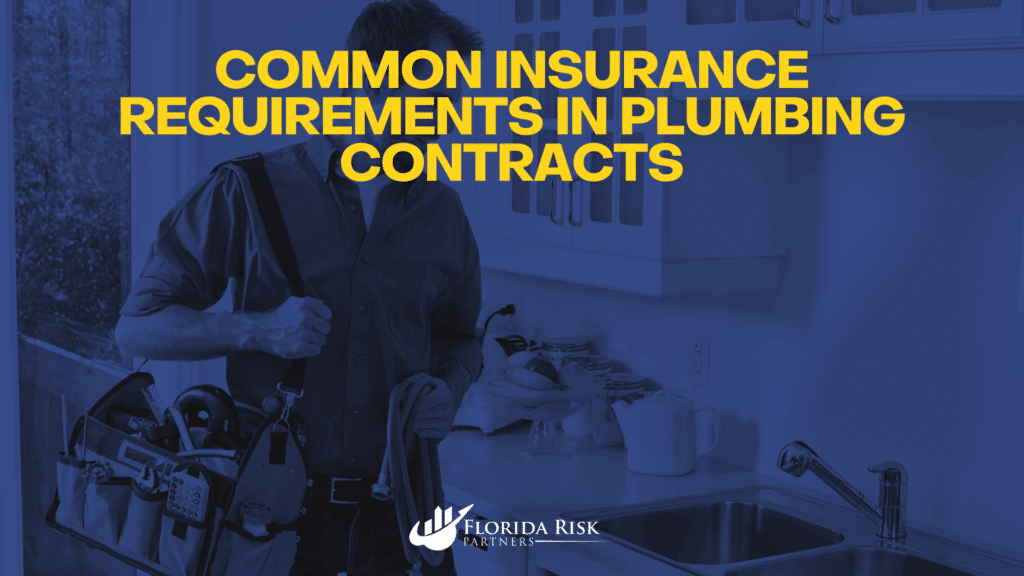-
Main Office: 1434 E. Bloomingdale Ave Valrico, FL 33596-6110
-
Phone: (888) 601-6660
-
Email: info@floridariskpartners.com

Bidding on a new job? Trying to secure a municipal project or work with a general contractor? Chances are, before your proposal gets greenlit, someone’s going to ask for proof of a surety bond and your insurance certificates—and maybe even more than that.
For many Florida plumbing contractors, bonding and insurance compliance can be confusing, but it’s an essential part of staying competitive, legal, and profitable. If you’re not ready to meet these requirements, you might miss out on big opportunities—or worse, get hit with delays or penalties for non-compliance.
In this post, we’ll break down everything you need to know about surety bonds and contractual insurance requirements, including when and why you need them, how they differ, and how working with the right insurance advisor can help you win jobs and protect your business.
What Are Surety Bonds and Why Do Florida Plumbers Need Them?
A surety bond is not insurance in the traditional sense. Instead, it’s a financial guarantee between three parties:
- You (the plumbing contractor)
- Your client (such as a property owner or GC)
- A surety company (typically through an insurance agency)
The bond guarantees that you’ll fulfill your contractual obligations. If you don’t, the surety company steps in to pay the client—then seeks reimbursement from you.
In simple terms: A surety bond is a promise that you’ll do what you said you’d do.
Common Types of Surety Bonds for Plumbing Contractors
There are several types of bonds you may encounter as a Florida plumber:
1. Contractor License Bond
Required by some counties or municipalities in Florida to legally operate. It ensures you’ll follow local laws and building codes. Not all areas require them, but they’re common in larger jurisdictions.
2. Bid Bond
Guarantees that your bid is submitted in good faith, and that you’ll follow through with the contract if selected. Often required on public projects.
3. Performance Bond

Protects the project owner by ensuring you’ll complete the work according to contract specs and timeline. If you fail to deliver, the surety may arrange for another contractor or compensate the owner.
4. Payment Bond
Guarantees that you’ll pay subcontractors, laborers, and suppliers. This protects against liens and legal action.
Florida’s Little Miller Act requires payment and performance bonds for public construction projects over $200,000.
How to Get Bonded as a Plumbing Contractor
Getting bonded in Florida usually requires the following:
- A completed bond application
- Business financials and personal credit history (especially for larger bonds)
- Details of the project or licensing jurisdiction
- Proof of insurance coverage
The cost of a bond (called the bond premium) is usually 1% to 3% of the bond amount, depending on your financial strength and experience.
Example: A $10,000 license bond might cost $100–$300 per year. A $100,000 performance bond could cost $1,000–$3,000.
Why Bonding Matters
Makes You Eligible for More Projects
Many government and large-scale private projects require bonds to bid. If you’re not bonded, you’re out of the running.
Enhances Your Reputation
Being bonded shows you’re a trustworthy contractor who meets obligations. It builds confidence with general contractors and property owners.
Provides Financial Protection for Clients
Clients feel more secure knowing they have a remedy if something goes wrong. This can be a deciding factor when comparing bids.
Contractual Insurance Requirements: What Florida Plumbers Need to Know
In addition to bonds, many contracts—especially on commercial and public jobs—have strict insurance requirements. If you don’t meet them, your bid could be disqualified, or your certificate of insurance (COI) may be rejected.
Here’s what to expect and how to stay compliant:
Common Insurance Requirements in Plumbing Contracts
General Liability Insurance
Usually required with:
- $1 million per occurrence
- $2 million aggregate limit
Some projects may require higher limits or that you carry an umbrella policy to reach $5 million or more.
Commercial Auto Insurance

Typically required if you have service vans or trucks on site. Contract may require:
- $1 million liability
- Hired & non-owned auto coverage
Workers’ Compensation Insurance
Required by law in Florida if you have one or more employees. Most contracts will also ask to see proof.
Umbrella / Excess Liability
Many larger contracts (especially from GCs or municipalities) require you to carry an umbrella policy to increase your total limits.
Endorsements & Certificate Requests That Trip Up Contractors
Here’s where many plumbers get stuck: even if you have the required policies, contract language often requires specific endorsements that must appear on your COI.
Common examples:
Additional Insured
Requires you to list the GC, property owner, or municipality as an additional insured on your policy. This gives them coverage under your policy for job-related incidents.
Primary and Non-Contributory Wording
Specifies that your policy will pay before any other insurance the additional insured may have.
Waiver of Subrogation
Prevents your insurance company from going after the project owner or GC to recover damages.
30-Day Notice of Cancellation
Ensures that your client is notified if your policy is canceled mid-term.
If your insurance agent isn’t experienced with contractor COIs and endorsements, your certificate could be rejected—and you could lose the job.
How to Stay Compliant with Contractual Requirements
1. Review the Insurance Clause Carefully
Before signing any contract, review the insurance section. Share it with your agent so they can make sure your policies match the requirements.
2. Use an Insurance Agent Who Specializes in Contractors
Don’t rely on a generalist. Commercial insurance for plumbers in Florida requires industry-specific knowledge—especially when dealing with bonding and endorsements.
3. Request Certificates in Advance
If you wait until the last minute, you risk delays that could affect your ability to start the job. Give your agent time to issue certificates, endorsements, or proof of bonding.
4. Track Renewal Dates
Many contracts require updated COIs each year. Failing to send renewals can put you in breach of contract.
Final Thoughts: Be Bonded, Be Insured, Be Ready
In Florida’s highly regulated construction environment, being properly bonded and insured is no longer optional—it’s a must-have if you want to grow your plumbing business and land higher-value projects.
Surety bonds protect your clients. Insurance protects your business. Together, they give you a competitive edge, a professional reputation, and peace of mind.
Call Us Or
Schedule an Appointment
Select an agent below to view our online calendars and select a day and time that works best for you or call us directly at 888-601-6660. When you use our online calendars, you will receive an email with more information.



